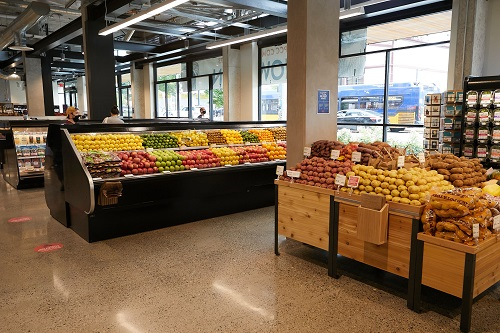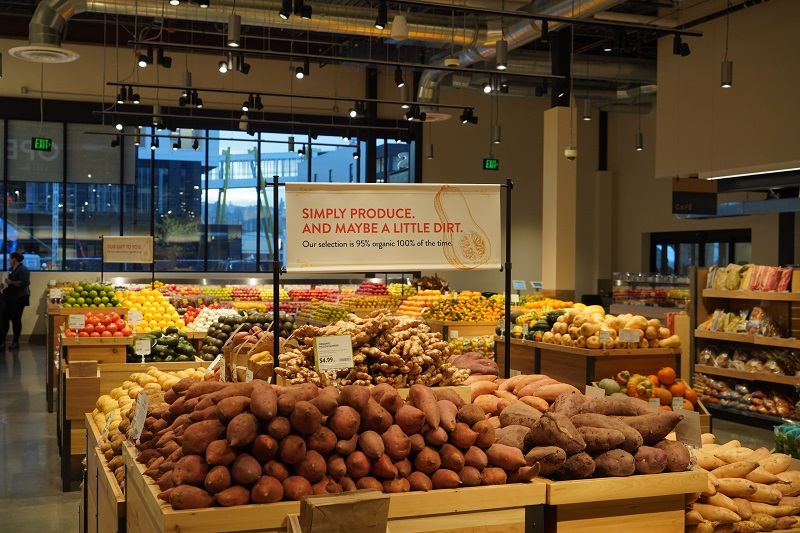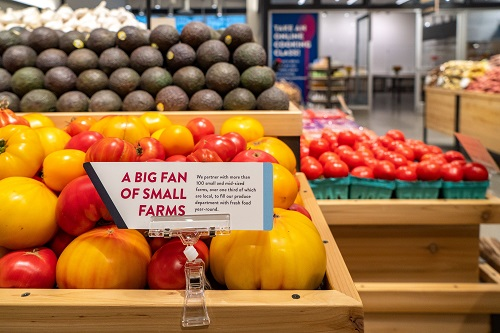In 2020, PCC Community Markets, a certified organic retailer and the largest cooperative grocer in the US, experienced strong sales and membership growth. Revenue increased to $383.2 million, a 25.6 percent jump from the prior year, and memberships grew by 35 percent.
PCC attributes its growth, in part, to a new membership benefits program launched in 2020, which offers co-op members the possibility of earning an annual dividend and gives them access to exclusive offers and events.
 PCC Community Markets produce department
PCC Community Markets produce department
“Last year, members received more than 30 unique offers with a total of almost $300 in savings on a range of quality products, including olive oil, wild-caught Alaska salmon, and PCC Organic Grass-Fed Yogurt,” says Kristen Woody, PCC’s senior communications manager. “Produce-specific member offers included a free pound of organic Honeycrisp apples, a free pound of organic yellow peaches, a free 5-ounce package of organicgirl greens, and a free pound of organic Bartlett pears.”
For fiscal year 2020, the PCC Board of Trustees approved a member dividend of 1.7 percent, which led to an average payment of $46.30 per active co-op member. (The precise amount per member was calculated by multiplying the member’s total annual co-op purchases by the 1.7 dividend percentage.) Members received their dividends in the form of a store credit in late April of this year.
“Last year, members received more than 30 unique offers with a total of almost $300 in savings on a range of quality products, including olive oil, wild-caught Alaska salmon, and PCC Organic Grass-Fed Yogurt.” - Kristen Woody
PCC’s membership growth has continued at a rapid clip in 2021, with average weekly new memberships outpacing 2020’s weekly average. The greater Seattle-area co-op now boasts an active membership of about 93,000 households.
In addition to its updated member benefits program, PCC attributes its strong financial performance to the opening of two new stores last year—in Bellevue and Seattle’s Central District. It also cites the COVID-related rise in retail food shopping as a factor, with co-op members making up the bulk of the increased sales (PCC does not require a membership to shop at its stores).
 PCC Community Markets produce department
PCC Community Markets produce department
PCC’s membership growth has continued at a rapid clip in 2021, with average weekly new memberships outpacing 2020’s weekly average.
PCC currently has two more new stores in the works—in Downtown Seattle and Madison Valley—and it also plans to relocate its Kirkland store to a larger location.
In 2020, PCC’s produce department, which is 95-percent certified organic, experienced strong sales of cooking vegetables and vitamin C-rich citrus. “The health concerns surrounding COVID-19 created an enormous demand for basics including broccoli, carrots, potatoes, onions, garlic, and all citrus items,” says Senior Produce Merchandiser Joe Hardiman.
 Joe Hardiman, Senior Produce Merchandiser, PCC
Joe Hardiman, Senior Produce Merchandiser, PCC
In terms of its outlook for 2021 produce sales, PCC doesn’t anticipate a repeat of 2020. “We don’t expect to see the same growth this year but are seeing different trends,” says Hardiman. “With the easing of pandemic-driven restrictions, the newfound freedom has propelled shoppers into more attractive impulse items as evident pre-pandemic. This includes berries, avocados, tropicals, melons, soft fruit, and specialty lettuce.”
Among soft fruit, Hardiman says organic apricots, nectarines, peaches, pluots, and cherries have all been popular. And when it comes to specialty lettuce, he says clamshell-packaged lettuce is a customer favorite due to consumers’ continued COVID-related sanitation concerns.
“With the easing of pandemic-driven restrictions, the newfound freedom has propelled shoppers into more attractive impulse items as evident pre-pandemic. This includes berries, avocados, tropicals, melons, soft fruit, and specialty lettuce.” -Joe Hardiman
“PCC is constantly searching for new high-demand organic items,” says Hardiman. “We are working directly with new local farms in addition to adding on suppliers within our organic wholesale network.”

Just recently, PCC’s produce department—which prioritizes local organic produce—began some new direct-sourcing relationships with several organic vegetable farms in the Puget Sound region, one of which is linked to the Washington Farmland Trust. Originally founded by PCC as the PCC Farmland Fund in 2000, the Washington Farmland Trust (now an independent organization) works to protect and steward threatened farmland in Washington state.
“We are working directly with new local farms in addition to adding on suppliers within our organic wholesale network.” -Joe Hardiman
Overall, Hardiman has a bright outlook for PCC’s produce program in 2021. “We are looking forward to the continued success of PCC’s organic produce sales and the new challenges of high demand spurred by the restored freedom of post-pandemic shopping,” he says.






